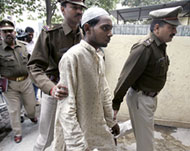Outrage over India murder acquittal
An ordinary murder case which should have been forgotten as soon as the verdict came out, is instead turning out to be a decisive test for India’s judiciary with country-wide protests against the verdict, pressing the courts to re-launch the murder investigation and trial.

The facts of what has come to be known as the Jessica Lall murder case appeared straightforward: On a hot summer night in 1999 a young woman was tending bar in an upmarket New Delhi restaurant refused to serve a drunk patron. It was around 2am. Closing time had passed, she told him.
So he shot her in the head.
Dozens of people witnessed the killing of Jessica Lall, bullet casings were recovered, and a suspect was quickly identified.
But that suspect, 24-year-old Manu Sharma, was the son of a powerful and wealthy politician with interests in sugar mills. He was only a few years out of Mayo College, one of India‘s most elite boarding schools.
Among the friends with him that night were a coterie of the young, the rich, and the well-connected. He and his friends, who were accused of helping to cover up the crime, insisted they were innocent.
The victim, a small-time model who moved on the fringes of New Delhi society, had few such connections.
For six years, the case moved through India‘s courts – fairly speedy for a legal system hobbled by corruption and a maze-like bureaucracy. And few were surprised when the verdict was announced on 21 February and all nine of the accused were acquitted.
Candlelight vigil
What surprised India was its own reaction: Protesters took to the streets, holding candlelight vigils and waving signs calling for justice; newspapers have kept the story on the front page day after day; officials from the president to the capital city’s police chief have called for a review of the investigation.
In a country that had all-but resigned itself to its tardy legal system, a backlash was born.
|
“I had virtually given up on the case, but the aftermath has surprised me most of all” Sabrina Lall, |
“I had virtually given up on the case, but the aftermath has surprised me most of all,” Sabrina Lall, the victim’s sister, said in an interview. “One can feel somewhat hopeful now that some good will come out of all this.”
On Monday, a sweeping police complaint was filed alleging that investigators had suppressed evidence, and witnesses had given false testimony as part of a criminal conspiracy to protect the accused men. While no one was named in the complaint, police officials say new trials are very possible.
“We will bring out the truth,” New Delhi police chief KK Paul said.
But truth has been a rarity in the Lall investigation from the start, and many wonder if the uproar over this case – with its beautiful, middle-class victim, cast of witnesses out of the gossip pages and a crime scene in a refurbished mansion – can bring change to an exhausted legal system where the poor suffer more than anyone.
Prosecution
India‘s courts are so slow that cases can take decades to resolve, bribery is often openly demanded and the powerful seldom face prosecution.
 |
|
India’s courts are so slow that |
Illustrating that, more than anything else, are the dozens of members of the national Parliament and hundreds of state legislators who stand accused of crimes ranging from tax evasion to murder.
For the poor, the situation is far different. Last month, a 70-year-old villager was released from prison after serving 38 years without trial. The police had lost his files, and he had been simply forgotten.
“People have started feeling that criminal trials are like a cobweb where small flies are getting caught and big people are dashing through,” the Indian Supreme Court said in a ruling this week on another case.
Many who work in the courts agree.
Prashant Bhushan, a prominent lawyer, said: “Those who run this country, the ruling establishment, are not particularly bothered by the collapse of the justice system.
“It is the common people in this country who are being hurt.”
The Jessica Lall case, critics say, is proof of how money and power are the real legal leverage.
After Lall’s killing, one main witness recanted his testimony and, according to relatives, suddenly became wealthy. Another witness disavowed his initial testimony, saying it had been transcribed by the police into Hindi, a language he insisted he barely spoke. He is now an actor in Hindi movies.
Contradictory
Police forensic investigators offered up contradictory reports about whether one or two guns had been fired. The socialite family who owned the restaurant, set in a quiet courtyard behind what was once a summer retreat for British colonialists, allegedly had the crime scene cleaned up before the investigation was completed.
 |
|
Police officials say new trials |
The problems had long been clear.
Paul – then a deputy police commissioner – said in a 2001 report on the investigation: “There has obviously been a conspiracy between the accused and certain officials.”
But the case trundled on until the acquittals.
Bhushan laughs when asked if he has hope for serious reform.
“That who are in power, they don’t have any interest in reforming it. They are the beneficiaries.”